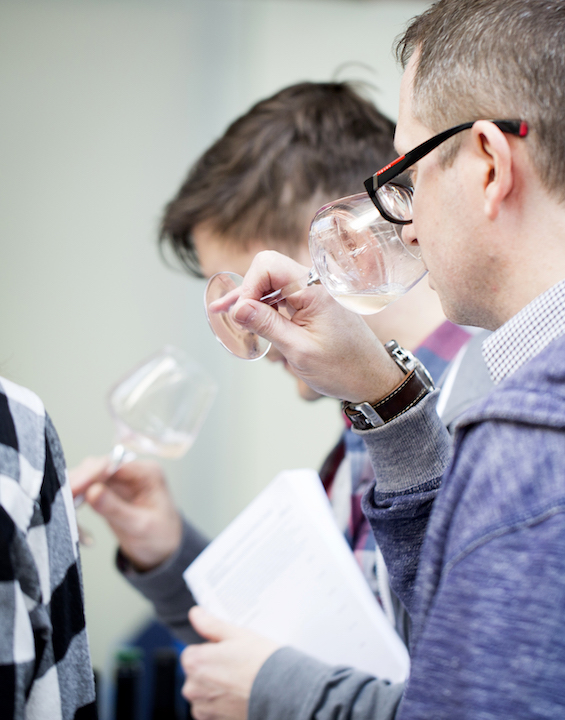Do not fret, it’s not a crisis
But this wine has brettanomyces!
“He was marked out by his relentless ability to find fault with others’ mediocrity–suggesting that a certain type of intelligence may be at heart nothing more or less than a superior capacity for dissatisfaction.”
–Alain de Botton, The Pleasures and Sorrows of Work

Overheard recently…
“Do you find this wine has too much brett for you?”
The winemaker to whom this question was addressed shrugged and said it was not a problem and that he liked the wine a lot.
Everything that is tedious and judgemental about wine criticism is encapsulated by that brief question, the fault-finding presumption, the need to break down a liquid into component blocks. It is the pointed “dumbing-up” of the standard critical palate that inflicts its lifeless denominators on the rest of us.
The so-called prism of “taste” has become an interrogator’s prison, the smudged lens of critical correctness the gross filter of direct experience. Treating a wine (like the one in this case) which has depth, subtlety and soul is akin to stripping the flesh and draining the blood from a living body in the anatomical desire to view the skeleton. If the wine is merely a means to a critique, then, as Mark Twain wrote, “It is easy to find fault, if one has that disposition. There was once a man who, not being able to find any other fault with his coal, complained that there were too many prehistoric toads in it.”

I have seen so many examples of joyless comparisons, of dispiriting analysis, of the desire not just to explain – but explain away. I’ve been with writer-critics drinking wine in Georgian monasteries, or at exuberant feasts, or supping in the open air, when the symbolism of drinking and sharing should surely override the need for objective assessment, and the act of communion engenders a natural spontaneity and immersion in the moment. But no, even in this environment where such faculties might take a break, the critic is still mightily constrained by a lack of imagination to the extent that his or her spirit cannot appreciate the purpose of wine is to dissolve such evaluative boundaries.
The brett accusation raises a further subaltern issue about whether it is reasonable to place someone on the spot and make your perception of faultiness into an article of doctrinal faith. If a taster intends solely to defend the ineffable rigour of his/her position, that sere emphatic logic that states absolute truths-about-wine, it leaves no room for discussion. Such certainty presupposes that some humans are finely-calibrated measuring utentils and that the opinions of others, and their instincts, have no value.
This is tendentious to say the least. Appreciation of wine is a matter of hitching your colours to a particular style. There are more things in heaven and earth, however, than the norm, and if this wine exhibits atonality, or that one displays a jagged shape, and none of them conform to the sugary pop rhythms of modern wine or the classical structure of old-fashioned wine, then that says more about the nature of the taster than the wine itself. Throughout history every artist, musician and writer who has taken a dramatic new aesthetic direction has been derided by the critical establishment for they are perceived to be breaking the code.
One should always be prepared to question the received wisdom about faults. The conclusions drawn from the science itself are not themselves watertight; instead they reveal the social and cultural context in which they are made. Dissing 6,000 or even 60 years of winemaking as if only today does mankind suddenly possess the knowledge how to make drinkable wine is torpid arrogance, part of a modern-day Panglossian world-view. Not all is for the best in the best of all possible worlds. The way, for example, that chemicals have been used in agriculture and winemaking, is nothing with progress and everything to do with devil-take-the-hindmost-quick-fix – even when that is a fix of drugs. We may think each step forward is a movement towards greater understanding, but in many respects we have forgotten more than we have learned.

The perennial fault-finder may know something of the microbiology of winemaking but may have little or no inkling of the historical-cultural-human aspect of winemaking. This partial understanding would have everyone believe for example, that oxidative winemaking, which has been going on since winemaking began, is either intrinsically inferior or plain wrong (ergo, the wine must be oxidised = faulty) and is just one example of how looking through the prism of modern correctness skews people’s views of wines past and present. Similarly, the view that wine should be entirely free of bacterial influence is, by extension, a modern argument for denaturing wines and making them thoroughly unobjectionable. Fair enough if you want a standardised, risk-averse product where everything is the result of controlled outcomes and chemical manipulations, but it does not qualify you to pass judgement on wines that are made in a more individual idiom, where deviation from the norm is embraced and the natural process is accompanied. Don’t find fault with what you don’t understand is a French maxim that holds true for wine appreciation.
There are some wines at the edge of wine reason that I love (and commit to) because I have seen how the vigneron works in situ, and I understand why he does what he does, what he is looking for and whether he achieves what he sets out to. I know wine writers who hate the same wines (not having met the winemaker or seen how he works), because those wines do not conform to their expectations of what wine should be. And that they don’t want to understand the flavours. So the winemaker has made a massive aesthetic error, his wines must be faulty and those who drink them and enjoy them are either incapable of recognising the faults and possibly conspiring in a fraud. Prejudice is just that, opinions immured in adamantium – and when you believe your knowledge somehow entitles you to assume that you have nothing more to learn.

Wine intelligence is not about the trappings of learning, the professorial inclination to pronounce on wines, to rate them (and berate them), to mark their faults and admire their potential faultlessness. Intelligence involves receptiveness, sensitivity, humility and the ability to taste outside the usual parameters.
Back to our earlier example. The wine may have flavours of clove, spice, smoky bacon – or shall we write it off blithely as being irreducibly tainted by 4-Ethylguaiacol? Identifying the fault negates the wine, the grower, as well as other wines and other growers. It’s the paralysing paradigm that puts the taster ahead of the wine and makes the wine no more or less than the sum of its faults. The 17th century pamphleteer Roger L’Estrange wrote: “Some read books only with a view to find fault, while others read only to be taught; the former are like venomous spiders, extracting a poisonous quality, where the latter, like the bees, sip out a sweet and profitable juice.” So do we treat with the wine with respect or interrogate it to death? Or maybe simply ditch the critical goggles occasionally and relax – with a glass of wine.


Interesting point of view.
I think that identifying Brett and asking if the winemaker finds it too much is not just stripping a wine down to its component parts. It’s not a joyless, wine by numbers game, (maybe it is some times but I dont think that)
I read that as “I dont think this bacon rind, Elastoplast smell aids the wine, in my opinion it would taste better if it were ‘clean’ as the Brett is hiding what is quite nice fruit underneath”.
It’s not just a way to look clever and dismiss a wine because you get Brett on it. The same goes for too much reductive character, too much oak, too little SO2 and oxidation etc… It’s not about saying it as a smarty pants it’s because the wine would be better (in my humble opinion) if whatever is detracting from it, wasn’t.
The opposite view could equally be argued that many wines are made poorly and then justified because of their low-intervention style, hands off winemaking or ‘authentic taste’. This shouldnt be an excuse for careless oxidation or dirty winemaking and microbial spoilage.
I dont feel like people are taking a campaign against natural wines or low-intervention wines, but just like you dont want clinical winemaking to make boring, clean, wine that tastes of nowhere, you cant have faulty wines excused by the opposite view.
Cheers! Good article
Thanks for your comments, Mike. My point is that a number of professional tasters seem to have a Platonic view of how wine should taste (rather than assess the wine for what it is). Some faults are really flaws or aspects of the wine – they can either be negated through intervention or allowed to exist and inform the wine with textures or flavours, whether certain tasters find these to be desirable or not. In my experience most low interventions vignerons are scrupulous and attentive to detail in the winery (they simply don’t use chemical interventions as part of recipe winemaking). The results are, by definition, unpredictable. Bad winemaking is bad winemaking, however, be it the result of zero intervention or lots of intervention. As for your last point would that it were true, but the vast majority of consumers and trade who came to the recent Real Wine Fair left enthusing about the sheer quality of the wines, whereas those who didn’t come (or have never attended a wine fair in this vein) remain convinced that natural wines are, by their very nature, faulty.